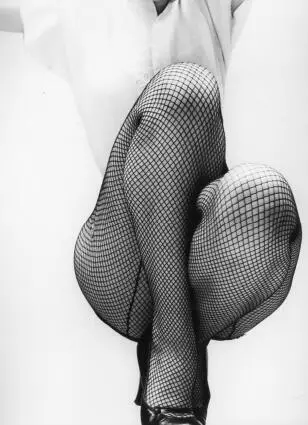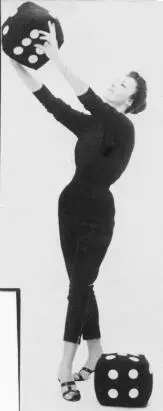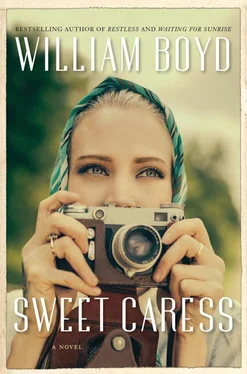‘Take all the time you wish, my dear,’ she said with a wide but empty smile. She had done her duty.
I did think about it, for some weeks, as my strength returned and I began to feel like my old self again. Cleve wrote, prompting me further. Nothing else appealing was on the horizon and I had to earn a living so, eventually, I replied to Priscilla Lucerne saying I would like to accept her kind offer. Formalities ensued; there were the inevitable bureaucratic delays, but in the summer of 1939 I embarked once again for the United States of America, leaving Europe on the brink of war.
WE HAD SPENT THE morning in Central Park, west side, up in the 80s, shooting outdoors as if we were in the country, and now, in the afternoon, had moved back to a rented studio on 7th Avenue in the Garment District. I was taking photographs for a section of American Mode entitled ‘As You Were Leaving’. On the final two or three pages of the magazine there would be a spread of fashion shots of ‘affordable’ clothes by unnamed American designers, tacked on as an afterthought for readers who couldn’t afford French couture — not that there was much of that available now the war was well under way. This was my daily bread; I didn’t enjoy it particularly and I wasn’t very good at it, to be honest, but it paid my wages and my name was never credited.
Similarly, the models we employed on ‘As You Were Leaving’ were not the best known, perhaps a little past their prime, happy to accept a reduction in their usual fee just to be in work. The model I had been photographing in Central Park was Kitty Angrec, in her thirties, like me, and, like me, relatively content to be a back-page girl.
I took her photograph, setting her against a wide paper magenta roll lit with a 500-watt spotlight and a photo-flood number one with silver reflector. I knew it would look fine but my heart wasn’t in it and neither was hers — we were both growing tired; it had been a long day. I had an assistant, Todd — they were always changing, some kid or other — and I left him to remove the film from the camera, label it and send it round to the Mode labs and followed Kitty into the changing rooms for a drink and a cigarette.
Kitty was a rangy girl who just missed out on being a true beauty. That strange geometry that a face has — eye versus nose versus lips — had managed only to make her ordinarily good-looking. Her top lip was a little too long, the brow-lash connection slightly skewed. . I had tried to analyse it but couldn’t quite understand what was so slightly out of kilter. We both lit cigarettes and I took out a quart of rum and poured a couple of shots into paper cups. Kitty began to undress.
‘You want to meet up tonight, Amory? I’ve got a sitter.’
Kitty had a three-year-old son whose father was in the US Navy.
‘Not a bad idea. What’ll we do?’
We ran through the options as she removed her clothes. She slipped off her skirt to reveal fishnet stockings and high heels, and as she shimmied out of her slip she dropped her cigarette and stooped to pick it up.
‘Don’t move,’ I said and scampered off to find my camera. I snatched it from Todd — it was a Rolleiflex.
‘You haven’t unloaded.’
‘Not yet, Miss Clay.’
I ran back into the dressing room and switched on all the lights.
‘Just do what you did before,’ I said to Kitty. ‘Stoop down as if you’re picking up your cigarette.’
She stooped, bending her knees reaching for an imaginary cigarette. Click.
The resulting image was my best ever fashion shot, in my opinion, of all the hundreds I took for American Mode. I shot it in ten seconds with the lighting available in the room. I had it printed up and took it to Priscilla the next day.
‘Nice,’ she said. ‘But I can’t run this in Mode. ’
‘Why not?’
‘We’re not Bazaar , we’re not Vogue . We’re American Mode. It’s a big difference.’ She handed the print back to me. ‘Nice try, Amory. But it’s too. . provocative. It would have been fine in your scandalous show but not in my magazine. Sorry.’

I thought about this as I slipped the print back into its buff envelope.
‘How do you know about my show? It was years and years ago.’
‘Cleve Finzi told me.’
The Cleve connection, once again.
‘Well,’ I said. ‘It was worth a try.’
‘Just keep up the good work, Amory,’ Priscilla said, beginning to rummage through papers on her desk. ‘We’re all very pleased with you.’
It didn’t take long to make me realise that I was no fashion photographer — time and again I looked at my photographs for American Mode and I saw only stiffness, fakery, self-consciousness — mediocrity. The few snapshots that I managed to take of the models as they changed or grabbed a cup of coffee or chatted at the end of a session seemed a thousand times more full of life. However, nobody wanted those images.

The American Mode years. The best and the worst.
But I dutifully fulfilled my assignments when I was called upon and I lived the good life that the USA effortlessly provided. I was earning $300 a month and was living on the Upper East Side (I didn’t want to go back to the Village). I was well, weight regained, hair glossy. No bleeding at all, apart from the odd smear or speckle on my knickers, and my menses had never restarted — stopped altogether, just as Sir Victor had predicted. Some months I would get the familiar cramps, the sensations, the scratchiness, the mood change — but nothing happened. Snub-Nose Lenny’s boot had done its damage.
As time went by I sometimes asked myself why I had come back to New York. The main reason, so I rationalised, was that it was a symbol of my return to health. My old life had resumed, Amory Clay was taking photographs again and being paid to do so even if it was strange to be in America as the war in Europe unfolded. I read about it in newspapers, heard bulletins on the radio; I had letters from home; I started sending parcels of food to Beckburrow — it was undeniably there, undeniably taking place, but somehow far in the background.
In the morning I would leave my apartment on 3rd Avenue and 65th and walk to the subway, picking up a newspaper in which I read about the Blitz, that Japan had invaded Singapore, that the Afrika Korps had retaken Tobruk, that the US Navy had triumphed in the Battle of the Coral Sea, but it was as if I were studying something in a dusty historical tome. Here in Manhattan all the lights were turned on, America’s profligacy was on tap and there was fun to be had.
Of course, the real reason I came back was Cleveland Finzi. Our affair restarted within two weeks of my landfall, though it was not like the old carefree days. I was worried, also, that first time we made love — it was the first time since my accident, however, to my relief, all seemed well — no pain, just pleasure. My libido was working as normal.
I may have felt the same but Cleve was different — so watchful he seemed almost terrified. We had to meet under conditions of secrecy that an expert spy would have been proud of.
‘Frances doesn’t even know you’re in the country,’ he explained to me when I moaned about the preposterous lengths we went to in order our tracks should be covered. ‘If she did, it would finish her.’
Читать дальше














